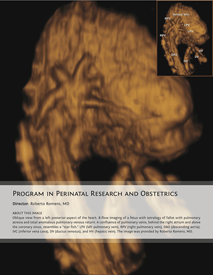You are here: Home > Program in Perinatal Research and Obstetrics
Program in Perinatal Research and Obstetrics
Director: Roberto Romero, MD
The Program in Perinatal Research and Obstetrics (PPRO) conducts clinical and laboratory research on maternal and fetal diseases responsible for excessive infant mortality in the United States. The PPRO focuses on the mechanisms of disease responsible for premature labor and delivery, with particular emphasis on the role of subclinical intrauterine infection and inflammation. The prenatal diagnosis of congenital anomalies is also a major area of interest.
The Perinatology Research Branch was created by Public Law (1993) to address the causes of excessive infant mortality in the United States. The Branch, now called the PPRO, studies pregnancy and pregnancy complications, and is housed in Detroit, Michigan, on the campus of Wayne State University and at the Detroit Medical Center. The location is appropriate because of high perinatal and infant mortality in the city as well as the contribution of ethnic social disparities to adverse pregnancy outcome. The PPRO provides state-of-the-art prenatal care to women enrolled in NICHD protocols and has made major contributions to the diagnosis of congenital anomalies and the understanding of the mechanisms of disease in premature labor/delivery and preeclampsia.
Preterm birth is the leading cause of perinatal mortality and morbidity worldwide and affects 12% of all pregnancies in the United States. This year, the PPRO reported a ground-breaking, international, multi-center randomized clinical trial in which 30,000 women were screened to identify a short cervix with ultrasound. Patients with a short cervix were randomly allocated to either vaginal progesterone or placebo. Vaginal progesterone administration reduced the rate of preterm birth at less than 33 weeks by 45% and the rate of respiratory distress syndrome by 61%. Moreover, the rate of preterm delivery at less than 28 weeks of gestation was reduced by 50%. Implementation of this strategy to reduce preterm birth is expected to save the United States $500 million per year.


